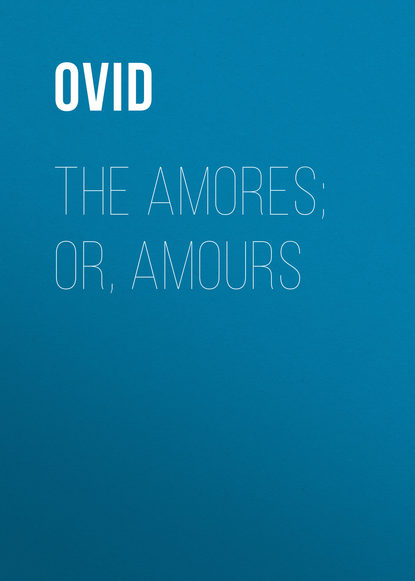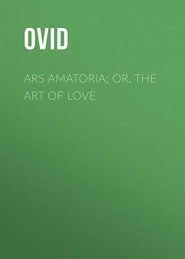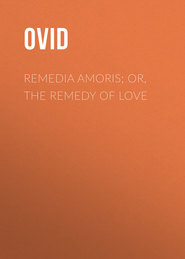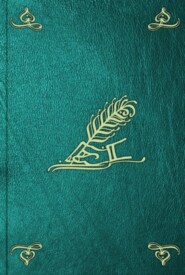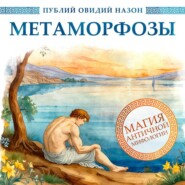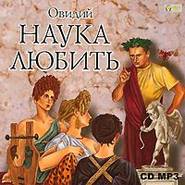По всем вопросам обращайтесь на: info@litportal.ru
(©) 2003-2024.
✖
The Amores; or, Amours
Настройки чтения
Размер шрифта
Высота строк
Поля
202 (return (#x2_x_2_i46))
[ Two nights together.—Ver. 46. When he slept with Acmena, under the form of her husband Amphion.]
203 (return (#x2_x_2_i51))
[ Doctoring your hair.—Ver. 1. Among the ancient Greeks, black hair was the most frequent, but that of a blonde colour was most valued. It was not uncommon with them to dye it when turning grey, so as to make it a black or blonde colour, according to the requirement of the case. Blonde hair was much esteemed by the Romans, and the ladies were in the habit of washing their hair with a composition to make it of this colour. This was called 'spuma caustica,' or, 'caustic soap,' wich was first used by the Gauls and Germans; from its name, it was probably the substance which had been used inthe present instance.]
204 (return (#x2_x_2_i51))
[ So far as ever.—Ver. 4. By this he means as low as her ancles.]
205 (return (#x2_x_2_i51))
[ Afraid to dress.—Ver. 5. He means to say, that it was so fine that she did not dare to curl it, for fear of injuring it.]
206 (return (#x2_x_2_i51))
[ Just like the veils.—Ver. 6. Burmann thinks that 'fila,' 'threads,' is better here than 'vela,' and that it is the correct reading. The swarthy Seres here mentioned, were perhaps the Chinese, who probably began to import their silks into Rome about this period. The mode of producing silk does not seem to have been known to Virgil, who speaks, in the Second Book of the Georgies, of the Seres combing it off the leaves of trees. Pliny also, in his Sixth Book, gives the same account. Ovid, however, seems to refer to silkworms under the name of 'agrestes tineæ,' in the Fifteenth Book of the Metamorphoses, 1. 372.]
208 (return (#x2_x_2_i52))
[ Neither the bodkin.—Ver. 15. This was the 'discerniculum,' a 'bodkin,' which was used in parting the hair.]
210 (return (#x2_x_2_i52))
[ Bid the bodkin.—Ver. 18. The 'acus' here mentioned, was probably the 'discemicirium,' and not the 'crinale,' or hair-pin that was worn in the hair; as the latter was worn when the hair was bound up at the back of the head; whereas, judging from the length of the hair of his mistress, she most probably wore it in ringlets. He says that he never saw her snatch up the bodkin and stick it in the arm of the 'ornatrix.']
211 (return (#x2_x_2_i52))
[ Iron and the fire.—Ver. 25. He alludes to the unnecessary application of the curling-iron to hair which naturally curled so well.]
212 (return (#x2_x_2_i52))
[ The very locks instruct.—Ver. 30. Because they naturally assume as advantageous an appearance as the bodkin could possibly give them, when arranged with the utmost skill.]
213 (return (#x2_x_2_i53))
[ Dione is painted.—Ver. 34. Pliny, book xxxv. c. 4, mentions a painting, by Apelles, in which Venus was represented as rising from the sea. It was placed, by Augustus, in the temple of Julius Caesar; and the lower part having become decayed, no one could be found of sufficient ability to repair it.]
214 (return (#x2_x_2_i53))
[ Lay down the mirror.—Ver. 16. The mirror was usually held by the 'ornatrix,' while her mistress arranged her hair.]
215 (return (#x2_x_2_i54))
[ Herbs of a rival.—Ver. 39. No person would be more likely than the 'pellex,' or concubine, to resort to charms and drugs, for the purpose of destroying the good looks of the married woman whose husband she wishes to retain.]
216 (return (#x2_x_2_i54))
[ All bad omens.—Ver. 41. So superstitious were the Romans, that the very mention of death, or disease, was deemed ominous of ill.]
217 (return (#x2_x_2_i54))
[ Germany will be sending.—Ver 45. Germany having been lately conquered by the arms of Augustus, he says that she must wear false hair, taken from the German captives. It was the custom to cut short the locks of the captives, and the German women were famed for the beauty of their hair.]
218 (return (#x2_x_2_i54))
[ Sygambrian girl.—Ver. 49. The Sygambri were a people of Ger many, living on the banks of the rivers Lippe and Weser.]
219 (return (#x2_x_2_i55))
[ For that spot.—Ver. 53. She carries a lock of the hair, which had fallen off, in her bosom.]
221 (return (#x2_x_2_i60))
[ My tongue for hire.—Ver. 6. Although the 'patronus pleaded the cause of the 'cliens,' without reward, still, by the use of the word 'pros-tituisse,' Ovid implies that the services of the advocate were often sold at a price. It must be remembered, that Ovid had been educated for the Roman bar, which he had left in disgust.]
222 (return (#x2_x_2_i61))
[ Mæonian bard.—Ver. 9. Strabo says, that Homer was a native of Smyrna, which was a city of Maeonia, a province of Phrygia. But Plutarch says, that he was called 'Maeonius,' from Maeon, a king of Lydia, who adopted him as his son.]
223 (return (#x2_x_2_i61))
[ Tenedos and Ida.—Ver. 10. Tenedos, Ida, and Simois, were the scenes of some portions of the Homeric narrative. The first was near Troy, in sight of it, as Virgil says—'est in conspectu Tenedos.']
224 (return (#x2_x_2_i61))
[ The Ascræan, tool—Ver. 11. Hesiod of Ascræa, in Boeotia, wrote chieflv upon agricultural subjects. See the Pontic Epistles, Book iv. ep. xiv. 1. 38.]
225 (return (#x2_x_2_i61))
[ With its juices.—Ver. 11. The 'mustum' was the pure jidcc of the grape before it was boiled down and became 'sapa,' or 'defrutum.' See the Fasti, Book iv. 1. 779, and the Note to the passage.]
226 (return (#x2_x_2_i61))
[ The son of Battus.—Ver. 13. As to the poet Callimachus, the son of Battus, see the Tristia, Book ii. 1. 367, and the Ibis, 1. 55.]
227 (return (#x2_x_2_i61))
[ To the tragic buskin.—Ver. 15. On the 'cothurnus,' or 'buskin,' see the Tristia, Book ii. 1. 393, and the Note to the passage. Sophocles was one of the most famous of the Athenian Tragedians. He is supposed to have composed more than one hundred and twenty tragedies, of which only seven are remaining.]
228 (return (#x2_x_2_i61))
[ Aratus.—Ver. 16. Aratus was a Greek poet, a native of Cilicia, in Asia Minor. He wrote some astronomical poems, of which one, called 'Phænomena,' still exists. His style is condemned by Quintilian, although it is here praised by Ovid. His 'Phænomena' was translated into Latin by Cicero, Germanicus Caesar, and Sextus Avienus.]
229 (return (#x2_x_2_i61))
[ The deceitful slave.—Ver. 17. Although the plays of Menander have perished, we can judge from Terence and Plautus, how well he depicted the craftiness of the slave, the severity of the father, the dishonesty of the procuress, and the wheedling ways of the courtesan. Four of the plays of Terence are translations from Menander. See the Tristia, Book ii. 1. 369, and the Note to the passage.]
[ Two nights together.—Ver. 46. When he slept with Acmena, under the form of her husband Amphion.]
203 (return (#x2_x_2_i51))
[ Doctoring your hair.—Ver. 1. Among the ancient Greeks, black hair was the most frequent, but that of a blonde colour was most valued. It was not uncommon with them to dye it when turning grey, so as to make it a black or blonde colour, according to the requirement of the case. Blonde hair was much esteemed by the Romans, and the ladies were in the habit of washing their hair with a composition to make it of this colour. This was called 'spuma caustica,' or, 'caustic soap,' wich was first used by the Gauls and Germans; from its name, it was probably the substance which had been used inthe present instance.]
204 (return (#x2_x_2_i51))
[ So far as ever.—Ver. 4. By this he means as low as her ancles.]
205 (return (#x2_x_2_i51))
[ Afraid to dress.—Ver. 5. He means to say, that it was so fine that she did not dare to curl it, for fear of injuring it.]
206 (return (#x2_x_2_i51))
[ Just like the veils.—Ver. 6. Burmann thinks that 'fila,' 'threads,' is better here than 'vela,' and that it is the correct reading. The swarthy Seres here mentioned, were perhaps the Chinese, who probably began to import their silks into Rome about this period. The mode of producing silk does not seem to have been known to Virgil, who speaks, in the Second Book of the Georgies, of the Seres combing it off the leaves of trees. Pliny also, in his Sixth Book, gives the same account. Ovid, however, seems to refer to silkworms under the name of 'agrestes tineæ,' in the Fifteenth Book of the Metamorphoses, 1. 372.]
208 (return (#x2_x_2_i52))
[ Neither the bodkin.—Ver. 15. This was the 'discerniculum,' a 'bodkin,' which was used in parting the hair.]
210 (return (#x2_x_2_i52))
[ Bid the bodkin.—Ver. 18. The 'acus' here mentioned, was probably the 'discemicirium,' and not the 'crinale,' or hair-pin that was worn in the hair; as the latter was worn when the hair was bound up at the back of the head; whereas, judging from the length of the hair of his mistress, she most probably wore it in ringlets. He says that he never saw her snatch up the bodkin and stick it in the arm of the 'ornatrix.']
211 (return (#x2_x_2_i52))
[ Iron and the fire.—Ver. 25. He alludes to the unnecessary application of the curling-iron to hair which naturally curled so well.]
212 (return (#x2_x_2_i52))
[ The very locks instruct.—Ver. 30. Because they naturally assume as advantageous an appearance as the bodkin could possibly give them, when arranged with the utmost skill.]
213 (return (#x2_x_2_i53))
[ Dione is painted.—Ver. 34. Pliny, book xxxv. c. 4, mentions a painting, by Apelles, in which Venus was represented as rising from the sea. It was placed, by Augustus, in the temple of Julius Caesar; and the lower part having become decayed, no one could be found of sufficient ability to repair it.]
214 (return (#x2_x_2_i53))
[ Lay down the mirror.—Ver. 16. The mirror was usually held by the 'ornatrix,' while her mistress arranged her hair.]
215 (return (#x2_x_2_i54))
[ Herbs of a rival.—Ver. 39. No person would be more likely than the 'pellex,' or concubine, to resort to charms and drugs, for the purpose of destroying the good looks of the married woman whose husband she wishes to retain.]
216 (return (#x2_x_2_i54))
[ All bad omens.—Ver. 41. So superstitious were the Romans, that the very mention of death, or disease, was deemed ominous of ill.]
217 (return (#x2_x_2_i54))
[ Germany will be sending.—Ver 45. Germany having been lately conquered by the arms of Augustus, he says that she must wear false hair, taken from the German captives. It was the custom to cut short the locks of the captives, and the German women were famed for the beauty of their hair.]
218 (return (#x2_x_2_i54))
[ Sygambrian girl.—Ver. 49. The Sygambri were a people of Ger many, living on the banks of the rivers Lippe and Weser.]
219 (return (#x2_x_2_i55))
[ For that spot.—Ver. 53. She carries a lock of the hair, which had fallen off, in her bosom.]
221 (return (#x2_x_2_i60))
[ My tongue for hire.—Ver. 6. Although the 'patronus pleaded the cause of the 'cliens,' without reward, still, by the use of the word 'pros-tituisse,' Ovid implies that the services of the advocate were often sold at a price. It must be remembered, that Ovid had been educated for the Roman bar, which he had left in disgust.]
222 (return (#x2_x_2_i61))
[ Mæonian bard.—Ver. 9. Strabo says, that Homer was a native of Smyrna, which was a city of Maeonia, a province of Phrygia. But Plutarch says, that he was called 'Maeonius,' from Maeon, a king of Lydia, who adopted him as his son.]
223 (return (#x2_x_2_i61))
[ Tenedos and Ida.—Ver. 10. Tenedos, Ida, and Simois, were the scenes of some portions of the Homeric narrative. The first was near Troy, in sight of it, as Virgil says—'est in conspectu Tenedos.']
224 (return (#x2_x_2_i61))
[ The Ascræan, tool—Ver. 11. Hesiod of Ascræa, in Boeotia, wrote chieflv upon agricultural subjects. See the Pontic Epistles, Book iv. ep. xiv. 1. 38.]
225 (return (#x2_x_2_i61))
[ With its juices.—Ver. 11. The 'mustum' was the pure jidcc of the grape before it was boiled down and became 'sapa,' or 'defrutum.' See the Fasti, Book iv. 1. 779, and the Note to the passage.]
226 (return (#x2_x_2_i61))
[ The son of Battus.—Ver. 13. As to the poet Callimachus, the son of Battus, see the Tristia, Book ii. 1. 367, and the Ibis, 1. 55.]
227 (return (#x2_x_2_i61))
[ To the tragic buskin.—Ver. 15. On the 'cothurnus,' or 'buskin,' see the Tristia, Book ii. 1. 393, and the Note to the passage. Sophocles was one of the most famous of the Athenian Tragedians. He is supposed to have composed more than one hundred and twenty tragedies, of which only seven are remaining.]
228 (return (#x2_x_2_i61))
[ Aratus.—Ver. 16. Aratus was a Greek poet, a native of Cilicia, in Asia Minor. He wrote some astronomical poems, of which one, called 'Phænomena,' still exists. His style is condemned by Quintilian, although it is here praised by Ovid. His 'Phænomena' was translated into Latin by Cicero, Germanicus Caesar, and Sextus Avienus.]
229 (return (#x2_x_2_i61))
[ The deceitful slave.—Ver. 17. Although the plays of Menander have perished, we can judge from Terence and Plautus, how well he depicted the craftiness of the slave, the severity of the father, the dishonesty of the procuress, and the wheedling ways of the courtesan. Four of the plays of Terence are translations from Menander. See the Tristia, Book ii. 1. 369, and the Note to the passage.]





